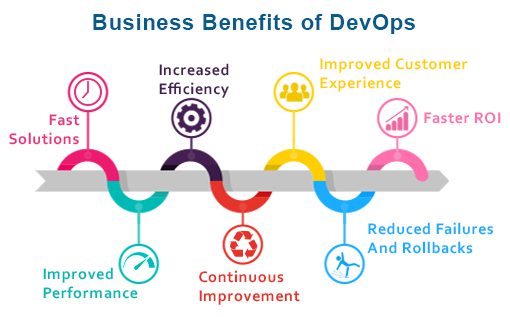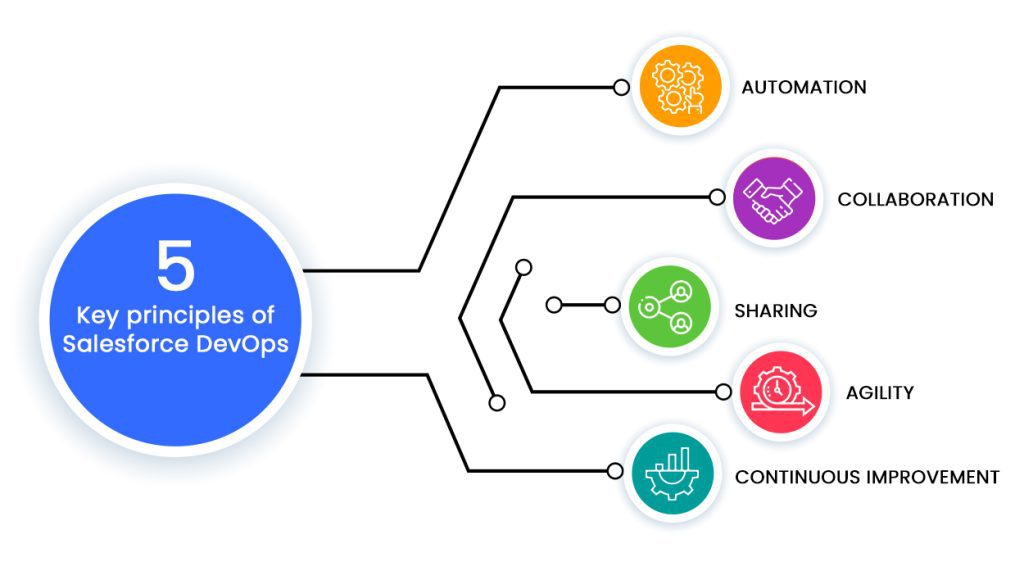DevOps is a set of practices that combines software development (Dev) and information technology operations (Ops) to enable faster, more reliable software delivery. It involves the collaboration and integration of development, quality assurance, and IT operations teams, and emphasizes communication, automation, and continuous feedback and improvement.

Why is DevOps important?
DevOps is important because it addresses the challenges that traditional software development methods face, such as long release cycles, high failure rates, and inefficient collaboration between teams. By integrating development and operations, DevOps enables faster time to market, better quality software, and improved collaboration and communication between teams.
What are the key principles of DevOps?
The key principles of DevOps include:
- Collaboration: DevOps emphasizes collaboration between development, quality assurance, and operations teams, as well as with stakeholders.
- Automation: DevOps relies on automation to streamline and speed up processes, reduce errors, and improve efficiency.
- Continuous integration and delivery: DevOps promotes continuous integration and delivery to enable faster, more frequent software releases.
- Infrastructure as code: DevOps uses infrastructure as code (IaC) to automate the provisioning and management of infrastructure.
- Continuous monitoring and feedback: DevOps emphasizes continuous monitoring and feedback to enable continuous improvement.
How does DevOps work?
DevOps works by breaking down the barriers between development and operations teams and fostering a culture of collaboration and communication. It involves the use of tools and automation to streamline processes, such as continuous integration and delivery, automated testing, and infrastructure as code. DevOps also emphasizes continuous monitoring and feedback to enable teams to identify and address issues quickly.

What are the benefits of DevOps?
The benefits of DevOps include:
- Faster time to market: DevOps enables faster, more frequent software releases, which can give organizations a competitive edge.
- Improved collaboration and communication: DevOps fosters a culture of collaboration and communication between teams, which can lead to better alignment and understanding of goals.
- Better quality software: DevOps emphasizes automation, continuous testing, and continuous monitoring, which can result in higher quality software with fewer bugs.
- Increased efficiency and productivity: DevOps can improve efficiency by automating processes and reducing waste, which can lead to increased productivity.
- Improved customer satisfaction: DevOps can lead to better customer satisfaction by enabling faster, more frequent software releases with improved quality and features.
In conclusion, DevOps is transforming software delivery by integrating development and operations teams and fostering a culture of collaboration, communication, and continuous improvement. By embracing DevOps principles and practices, organizations can achieve faster time to market, better quality software, and improved efficiency and productivity.
DevOps: Transforming Software Delivery through Integration of Development and Operations
In today’s fast-paced digital world, organizations are under constant pressure to deliver software faster and with higher quality. The traditional approach to software development, where development and operations teams work in silos, often leads to long release cycles, high failure rates, and inefficient collaboration. DevOps is a set of practices that seeks to address these challenges by integrating development and operations teams and fostering a culture of collaboration, communication, and continuous improvement.
What is DevOps?
DevOps is a combination of software development (Dev) and information technology operations (Ops) practices that aim to enable faster, more reliable software delivery. DevOps involves the collaboration and integration of development, quality assurance, and IT operations teams, and emphasizes communication, automation, and continuous feedback and improvement.

The key principles of DevOps include:
- Collaboration: DevOps emphasizes collaboration between development, quality assurance, and operations teams, as well as with stakeholders. This helps to improve alignment and understanding of goals, reduce waste, and foster a culture of innovation and continuous improvement.
- Automation: DevOps relies on automation to streamline and speed up processes, reduce errors, and improve efficiency. Automation can help to reduce the risk of human error, ensure consistent processes, and free up time for teams to focus on higher-value tasks.
- Continuous integration and delivery: DevOps promotes continuous integration and delivery to enable faster, more frequent software releases. Continuous integration involves integrating code changes into a shared repository on a regular basis, while continuous delivery involves ensuring that software is always in a releasable state, with features and functionality that can be deployed to production at any time.
- Infrastructure as code: DevOps uses infrastructure as code (IaC) to automate the provisioning and management of infrastructure. IaC allows teams to define and manage infrastructure in a declarative way, using code and version control systems, which can improve consistency, reduce errors, and speed up deployments.
- Continuous monitoring and feedback: DevOps emphasizes continuous monitoring and feedback to enable teams to identify and address issues quickly. Continuous monitoring involves monitoring the performance and availability of software and infrastructure in real-time, while continuous feedback involves providing feedback on software features and functionality throughout the development process.
How does DevOps work?
DevOps works by breaking down the barriers between development and operations teams and fostering a culture of collaboration, communication, and continuous improvement. It involves the use of tools and automation to streamline processes, such as continuous integration and delivery, automated testing, and infrastructure as code. DevOps also emphasizes continuous monitoring and feedback to enable teams to identify and address issues quickly.
What are the benefits of DevOps?
The benefits of DevOps include:
- Faster time to market: DevOps enables faster, more frequent software releases, which can give organizations a competitive edge. By reducing the time it takes to deliver software, DevOps can help organizations to respond more quickly to changing market conditions and customer needs.
- Improved collaboration and communication: DevOps fosters a culture of collaboration and communication between teams, which can lead to better alignment and understanding of goals. By breaking down the barriers between development and operations, DevOps can help to improve collaboration and communication between teams and reduce the risk of misunderstandings and conflicts.
- Better quality software: DevOps emphasizes automation, continuous testing, and continuous monitoring, which can result in higher quality software with fewer bugs. By automating processes and testing software continuously, DevOps can help to catch issues early in the development process, reducing the risk of defects and improving the overall quality of software.










